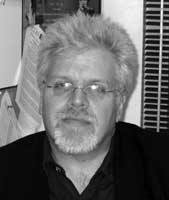
Profile:
Zalmen Mlotek & the
Yiddish Theater
by Joanna Leefer
In the early 20th century, New York
City was the host to two dozen Yiddish Theaters troupes entertaining
more than two million people. As Jewish immigrants assimilated
and moved out of the city, the audience dwindled. Today only
one of these theaters survives: The Folksbiene. Now in its 89th year, it is
guided by its impassioned executive director, Zalmen Mlotek,
who believes "We have a treasure in Yiddish cultureÉit's
not just a window into the past; it's a vibrant way of expressing
JewishnessÉin a non-threatening, non-religious way." His
mission is to "present Yiddish cultural events with enough
English culture to attract new audiences."
One of Mlotek's newest contributions
to Yiddish theater is the addition of super titles to all
his productions. As with opera, Mlotek believes this addition
will allow a non-Yiddish speaking audience to "enjoy
this rich tradition."
Mlotek also hopes to interest young
people in the Yiddish productions. He is accomplishing this
through the creation of the Folksbiene Company's Kids and
Yiddish Theater productions. Now in its 5th season, Mlotek
hopes this series will "Éunite
the generations, and make Yiddish broadly accessible in a multi-cultural
city."
This year's production for children
is a whimsical combination of magic and music woven together
in the theatrical production called "Farmisht and Far-Fetched!" This zany comedy
is directed by Joanne Borts with musical direction by Zalmen
Mlotek. Mlotek describes the show as a blend of "Saturday
Night Live and Sesame Street, intertwined with English and
Yiddish." The production, which opened recently at Manhattan's
Jewish Community Center, is a fusion of Yiddish and English,
with a dash of hip-hop. The cast includes five children actors
between the ages of 9 and 17 years old, and the internationally
acclaimed musician/magician Josh Dolgin who is known for combining
hip-hop and Klezmer on stage and in recordings.
This year Moltek also presents a revival of The
Lady Next Door, a comedic drama originally introduced and performed in
1916 as Di Nekstdorike. The original production, written by
Leon Kobrin, depicted real life conditions in a Jewish tenement.
Although Motlek feels it's important
to know the background of Yiddish Theater, he is not a purist.
He feels Yiddish Theater should evolve. "Every generation
should put a personal stamp on it, as long as it translates
and turns someone on."
Zalmen Mlotek is not a stranger
to Yiddish theater. "I
grew up with Yiddish. To me, Yiddish is a living, breathing
life style." Mlotek's father and mother were both prominent
figures in the Jewish cultural community. His mother, Hannah,
a publisher of several Yiddish musical anthologies, was honored
recently by the Milken Foundation. His father, Joseph,
was a producer of Yiddish festivals in the U.S.
Both his parents were regular contributors
to the Jewish Forward, a weekly Yiddish newspaper. Their
columns answered reader's questions about titles and origins
of fragments of old Yiddish songs. After research they identified
the songs and later published them in their entirety. Issac
Bashevis Singer, the Nobel-prize winning Yiddish writer,
referred to the elder Mloteks as the "Sherlock
Holmes of Yiddish songs."
Zalman Mlotek describes his life
as a "natural evolution
to become involved in Yiddish music, theater, language and
culture." He attended Workman Circle schools, then studied
at Juilliard, and with Leonard Bernstein. He began conducting
shows in Yiddish summer camps in the Catskills. He now travels
extensively, as a one-man ambassador, to Russia and Europe,
conducting classes and workshops on Yiddish theater.
The first Yiddish theater in America
began in 1882, an outgrowth of the Purim plays of the 1770s
in Europe. Thanks to Mlotek, the tradition is "alive and well" and
expanding around the world.#
